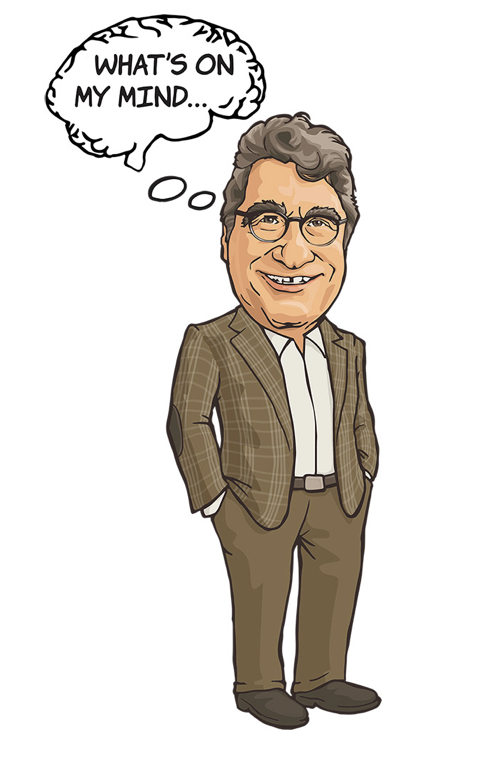 On Monday, we welcomed former U.S. President George W. Bush to our campus as part of the Chancellor’s Lecture Series. It was an incredible opportunity to engage with our 43rd president, one of only four living former presidents, and Jon Meacham, Vanderbilt University’s Carolyn T. and Robert M. Rogers Chair in American Presidency and the Pulitzer-Prize winning journalist who wrote the acclaimed biography of President George H.W. Bush. As anyone in the packed crowd on Monday evening can attest to, our conversation was a layered look at topics ranging from democracy and Abraham Lincoln, to life after being in the limelight, to the power of art, to the values of great leaders.
On Monday, we welcomed former U.S. President George W. Bush to our campus as part of the Chancellor’s Lecture Series. It was an incredible opportunity to engage with our 43rd president, one of only four living former presidents, and Jon Meacham, Vanderbilt University’s Carolyn T. and Robert M. Rogers Chair in American Presidency and the Pulitzer-Prize winning journalist who wrote the acclaimed biography of President George H.W. Bush. As anyone in the packed crowd on Monday evening can attest to, our conversation was a layered look at topics ranging from democracy and Abraham Lincoln, to life after being in the limelight, to the power of art, to the values of great leaders.
The event was a prime example of the importance of the Chancellor’s Lecture Series. An intimate look at Bush’s time in the oval office from 2001-2009, the conversation also seeped into more evergreen themes—the power of mortality, the cyclical nature of American democracy, the tension between our internal principles and the way they are expressed. We welcome speakers like President Bush so as to challenge our community to think critically, and in so doing, to expand our own understanding—even if it is through questioning or refutation.
I have every confidence that our upcoming guests, including political leader and recent Georgia gubernatorial candidate Stacey Abrams, former congressman Barney Frank, journalist Bob Kaiser, physicist Rush Holt, and the first African American woman in space, scientist Mae Jemison, will bring their diverse perspectives to the table that will lead to bigger questions and more refined answers, as all great discourse does. These dialogues may be challenging, but they are also enlightening and ultimately advance our collective knowledge.
Civil discourse—and its relationship to the American identity—has always been a pressing topic for George W. Bush, the many leaders who came before him and the leaders of today. It’s a theme that’s been on my mind a lot this semester as I have had the pleasure of co-teaching a history class with Professor Meacham titled Hours of Crisis in U.S. History. The course explores the decisive moments that have shaped our nation’s past and served as weighty catalysts for change. From the rise of the desire for independence among American colonies in the 18th century and the juxtaposition of that fight for freedom in a society that allowed slavery, to the origin of partisanship, to the Civil Rights movement of the 1960s. Using Meacham’s latest book, The Soul of America: The Battle for our Better Angels as a pertinent framework, we have explored the ebbs and flows of history, the nuances of perspective and our collective values—the results of what Meacham calls America’s unflinching “soul”—that continue to define our story.
President Bush was kind enough to visit the class on Monday. He captivated students with his rarified take on the subject matter at hand, which is informed not only by his status as a former president but also as a voracious reader of presidential biographies. The students were enthralled by his perspective; and the sentiment went both ways. I was delighted, and not surprised, when President Bush told me after class that our students are, indeed, “awesome.”
In the class, we have covered many of the events of the last 400 years, a number of which have defined our identity as a country: from the many years of slavery in America, to the Emancipation Proclamation and the Civil War, to the Great Depression, to the campaign of Joe McCarthy in the early 1950s. Throughout it all, I can’t help but notice that America’s leading research universities have been a constant: strongly rooted in their educational mission while also wrestling with, adapting to and growing alongside the constant change in the world around them. Institutions like Vanderbilt have weathered the ups and downs of politics, the divisive issues, the shifts in allegiances, and continue to unite people, to advance discoveries, to help us move forward.
As a university that prides itself on inclusivity and diversity above all, Vanderbilt is—in many ways—a microcosm of what Meacham calls “the soul” of our country, defined by our “inclination to open our arms rather than clench our fists; to look out rather than to turn inward; to accept rather than to reject.”
Much like America aspires to do, we continuously work to acknowledge the oversights we have made, the rifts we have allowed, the priorities that needed to shift. We channel this knowledge toward learning to be better and making progress. We openly discuss the problems—whether with a former president in a packed auditorium or among ourselves in the hallways—and we think big about the insights offered by those who have different perspectives. We speak with President Bush not just to pick his brain or hear his insights, but to gauge how his own views can amplify and activate our own.
As an institute of higher education, we also stay focused amid the invariable shifts. Our curriculums will change, the magnolia trees will grow, but our mission is, and always will be, steady: to make our university—and our nation and global society—a much better place.